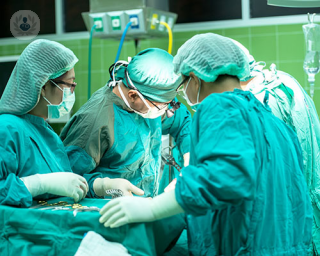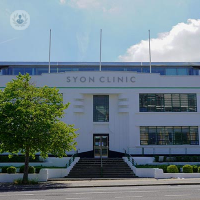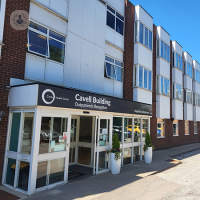What is an anal fistula?
An anal fistula is a small channel or tunnel that develops between the end of the bowel and the skin near the anus (i.e. where stool leaves the body). These can result in bleeding when passing stool and cause pain and discomfort. Often anal fistulas won’t get better on their own and will usually require treatment. Surgery is a common recommendation for treating anal fistulas.

What are the symptoms of an anal fistula?
The most common symptoms of an anal fistula are:
- Pain where the fistula is, which can be made worse when sitting down or passing stool.
- Passing pus or blood.
- Skin irritation around the anus.
- Fever.
What causes an anal fistula?
Anal fistulas are usually a result of an anal abscess that has not healed properly. When an anal abscess has not healed properly, the pus has drained away, but leaves a channel or tunnel behind. It is common for an anal abscess to result in anal fistula.
Other causes of anal fistulas include:
- Surgical complication near the anus.
- Crohn’s disease.
- Diverticulitis.
What is the treatment for an anal fistula?
As anal fistulas usually do not heal on their own, surgery is often required. There are numerous types of surgery, including:
- Fistulotomy – the length of the fistula is cut open so that the contents can be removed. Once healed, a flat scar is left behind.
- Seton procedures – surgical thread (a seton) is placed into the fistula and left there for a few weeks. This helps it to heal before another procedure is performed to treat it fully.
- Fibrin glue – a non-surgical treatment option that involves glue being injected into the fistula to seal the channel, with the opening stitched shut. However, long-term results with this procedure are not as successful with further surgery being required in many cases.
- Flap procedures – often used in more complex cases, a piece or flap of tissue from skin around the anus is removed. The fistula tract is also removed and the flap if reattached where the fistula opening was.
What kind of specialist treats anal fistulas?
A colorectal surgeon is the specialist in the surgical procedure to correct anal fistula.
10-23-2015 06-05-2023Anal fistula
What is an anal fistula?
An anal fistula is a small channel or tunnel that develops between the end of the bowel and the skin near the anus (i.e. where stool leaves the body). These can result in bleeding when passing stool and cause pain and discomfort. Often anal fistulas won’t get better on their own and will usually require treatment. Surgery is a common recommendation for treating anal fistulas.

What are the symptoms of an anal fistula?
The most common symptoms of an anal fistula are:
- Pain where the fistula is, which can be made worse when sitting down or passing stool.
- Passing pus or blood.
- Skin irritation around the anus.
- Fever.
What causes an anal fistula?
Anal fistulas are usually a result of an anal abscess that has not healed properly. When an anal abscess has not healed properly, the pus has drained away, but leaves a channel or tunnel behind. It is common for an anal abscess to result in anal fistula.
Other causes of anal fistulas include:
- Surgical complication near the anus.
- Crohn’s disease.
- Diverticulitis.
What is the treatment for an anal fistula?
As anal fistulas usually do not heal on their own, surgery is often required. There are numerous types of surgery, including:
- Fistulotomy – the length of the fistula is cut open so that the contents can be removed. Once healed, a flat scar is left behind.
- Seton procedures – surgical thread (a seton) is placed into the fistula and left there for a few weeks. This helps it to heal before another procedure is performed to treat it fully.
- Fibrin glue – a non-surgical treatment option that involves glue being injected into the fistula to seal the channel, with the opening stitched shut. However, long-term results with this procedure are not as successful with further surgery being required in many cases.
- Flap procedures – often used in more complex cases, a piece or flap of tissue from skin around the anus is removed. The fistula tract is also removed and the flap if reattached where the fistula opening was.
What kind of specialist treats anal fistulas?
A colorectal surgeon is the specialist in the surgical procedure to correct anal fistula.


Understanding piles, fissures, and fistulae
By Mr Parv Sains
2024-11-21
Piles, fissures, and fistulae are three distinct conditions that can cause pain in the anus. They are very different but often patients don’t know how they differ. In our latest article, esteemed surgeon Mr Parv Sains explains, clearly, what each of these conditions is, their causes, and whether they can lead to more serious health issues. See more


Understanding anal fistula
By Mr Andrew Brian Williams
2024-11-21
An anal fistula is something which causes discomfort, pain and embarrassment for those affected. Mr Andrew Brian Williams, a general and colorectal surgeon with a special interest in anal fistula explains everything you need to know about the condition, including treatment options. See more


How is an anal fistula treated?
By Professor Lee Dvorkin
2024-11-20
Anal fistulas are a painful and distressing condition, and can cause persistent and troubling symptoms for the patient. In his latest online article, renowned colorectal surgeon Professor Lee Dvorkin explains this condition in detail. He offers his expert insight into the symptoms, causes and treatment of fistulas. See more


An expert explains: What is an anal fistula?
By Mr Raj Harshen
2024-11-20
Leading consultant general surgeon Mr Raj Harshen, who specialises in colorectal surgery, gives an all-you-need-to-know guide on anal fistulas and their treatment. See more
Experts in Anal fistula
-
Mr Abhay Chopada
SurgeryExpert in:
- Polyps
- Bowel surgery
- Piles (haemorrhoids)
- Anal fistula
- Hiatal hernia surgery
- Colon cancer
-
Mr Pasquale Giordano
Colorectal surgeryExpert in:
- Hernia
- Piles (haemorrhoids)
- Laparoscopy
- Colorectal cancer
- Colonoscopy
- Anal fistula
-
Professor Richard Cohen
Colorectal surgeryExpert in:
- Inflammatory bowel disease (IBD)
- Blood in stool (rectal bleeding)
- Anal fissure
- Piles (haemorrhoids)
- Anal fistula
- Colonoscopy
-
Professor Tan Arulampalam
SurgeryExpert in:
- Hernia
- Bowel surgery
- Gallbladder surgery
- Pilonidal sinus
- Anal fistula
- Endoscopy
-
Mr Richard Lovegrove
Colorectal surgeryExpert in:
- Ulcerative colitis
- Colorectal cancer
- Crohn's disease
- Anal fistula
- Piles (haemorrhoids)
- Colonoscopy
- See all

Syon Clinic - part of Circle Health Group
Syon Clinic - part of Circle Health Group
941 Great West Rd, Brentford TW8 9DU
No existe teléfono en el centro.
By using the telephone number provided by TOP DOCTORS, you automatically agree to let us use your phone number for statistical and commercial purposes. For further information, read our Privacy Policy
Top Doctors

Goring Hall Hospital - part of Circle Health Group
Goring Hall Hospital - part of Circle Health Group
Bodiam Ave, Goring-by-Sea, Worthing BN12 5AT
No existe teléfono en el centro.
By using the telephone number provided by TOP DOCTORS, you automatically agree to let us use your phone number for statistical and commercial purposes. For further information, read our Privacy Policy
Top Doctors

The Cavell Hospital - part of Circle Health Group
The Cavell Hospital - part of Circle Health Group
Cavell Dr, Uplands Park Rd, Enfield EN2 7PR
No existe teléfono en el centro.
By using the telephone number provided by TOP DOCTORS, you automatically agree to let us use your phone number for statistical and commercial purposes. For further information, read our Privacy Policy
Top Doctors
-
Syon Clinic - part of Circle Health Group
941 Great West Rd, Brentford TW8 9DU, West LondonExpert in:
- Allergies nose and ears
- Allergy Dermatitis
- Allergy
- Clinical analysis
- Anxiety
- Digestive
-
Goring Hall Hospital - part of Circle Health Group
Bodiam Ave, Goring-by-Sea, Worthing BN12 5AT, Goring-by-SeaExpert in:
- Hip
- Cataracts
- Gallbladder surgery
- General Surgery
- Orthopaedic surgery
- Hernia
-
The Cavell Hospital - part of Circle Health Group
Cavell Dr, Uplands Park Rd, Enfield EN2 7PR, North LondonExpert in:
- endoscopy
- Gastroenterology
- Shoulder and elbow
- Hand and wrist
- Otolaryngology
- Foot and ankle
- See all
- Most viewed diseases, medical tests, and treatments
- Undescended testicle (Cryptorchidism)
- Weight loss injections
- Nipple discharge
- Abdominal pain
- Endovenous laser treatment (EVLA)
- Minimal access surgery (keyhole surgery)
- Head and neck cancer
- Neck lump
- Bariatric surgery
- Acellular dermal matrix (ADM)







